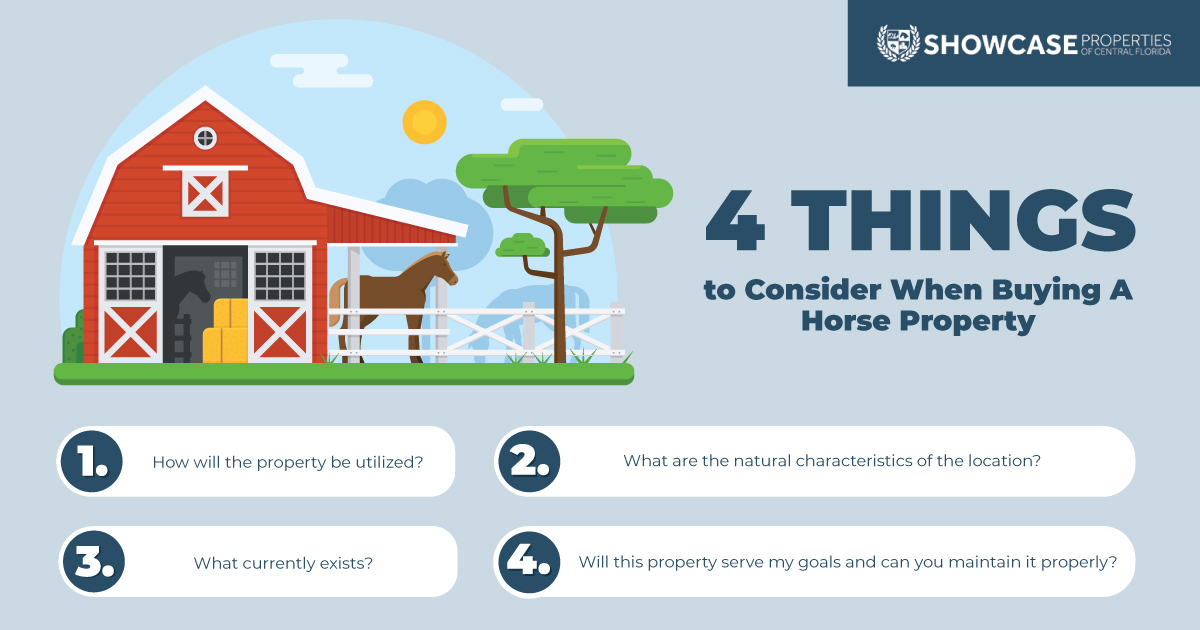
Things to Consider When Buying a Horse Property
For a horse farm or property to be successful it must balance the goals of the owner, the natural demand of the property, and the health, safety and well-being of the horse. There are many things to consider to meet these goals:
1. How will the property be utilized?
Assess your end use. Is the residence as important as the actual equine facility to your overall intentions? It’s important to make sure the horse property fits your growth plan. Work up any estimated financial plans for any improvements and make sure it fits your short term and long term goals. Do your homework! Investigate and find out from your neighbors about the area and any local community growth that may affect your plans, such as retail or road development or other city planning for growth. This may be a deal-breaker in the long term.
2. What are the natural characteristics of the location?
Investigate all present challenges with climate, elevation, seasonal changes, soil drainage and basic utility accessibility. Are the wells suitable for a working horse farm? In the Southeast, proper drainage and run-off are key factors to a horse farm and the well-being and safety of the horses. It is recommended to retain a professional civil engineer to examine possible situations down the road.
3. What currently exists?
Check with the county to see what steps will need to be done to organize the property the way you envision it. Evaluate what assets or limitations come with the horse property. What is the tax status and classification? What efforts have to be done on existing structures and are there any permitting or zoning limitations?
4. Will this property serve my goals and can you maintain it properly?
Determine if the horse property is suited for your lifestyle and your horses as well. Make sure you have a sound and proper budget to upgrade the property to fit your needs and the needs of your horses. Pay particular attention to fencing, water, pasture and manure management. Sturdy and proper horse fencing is a key long-term investment and helps with resale value. In Florida, you must consider the BMP’s or Best Management Practices in protecting the local water resources. Improper irrigation techniques not only place stress on water supplies, but can also damage your property and your neighbor’s property by causing erosion, flooding, etc. Uncontrolled animal waste can also be harmful to the water supply long-term. A soil evaluation can also be done by your local county extension office to determine better growth and pasture management. All are important factors to consider in purchasing your horse property. Again, do your homework!
Source: Field Sport Concepts affiliate John Blackburn, AIA, Senior Principal at Blackburn Architects, P.C. and Southwest Florida Water Management District. watermanagement.org – 1-800-423-1476

In the market for a horse farm of your very own? Contact a Showcase REALTOR® today. Our Ocala equestrian real estate agents are ready to help you find the perfect horse ranch to call home. Our horse farm realtors have an extensive collection of luxury ranches, equine properties, agricultural land, horse farms for sale in Ocala and Alachua County farms for sale.
For more reading about buying a farm in Marion county check out Turn Key Mini Farms in Central Florida,Ocala Farms for Sale Under $500,000, and Ocala Farms for Sale Over $500,000. You might also like our extensive Guide to Buying A Horse Farm.
Related Blogs
How to Choose a Horse Farm for Your Future Race Horse
Benefits of Living in an Equine Community
Choosing An Ocala Equestrian Property
Finding The Perfect Track Property
Benefits of Working With An Equestrian Realtor